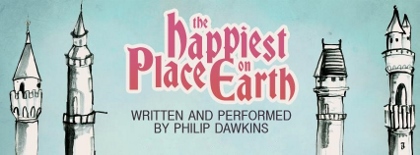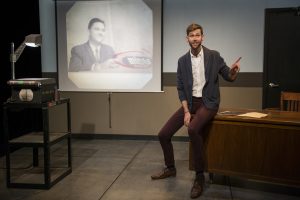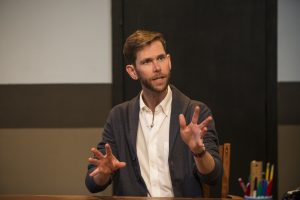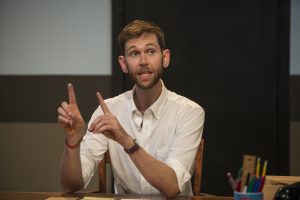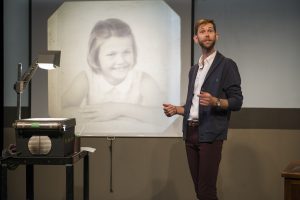WHEN YOU WISH UPON A THEME PARK
You just know that the title The Happiest Place on Earth is ironic–or, like Ringling Brothers’ “greatest show on earth,” bombastic. How could it not be, given the subject? Over the last 66 years, Disneyland, Walt’s first conceptual amusement park, has become a byword for bourgeois escapism from contemporary problems, denial by fantasy, and mind-numbing nostalgia for a time and place that never was. It’s also a terrific tourist attraction.
Much of playwright Philip Dawkins’ autobiographical solo show–snapshots from a family album taken in the Lands of Tomorrow, Frontier, Adventure and Fantasy—is blatantly familiar and, at times, theatrical overkill. It rings too true to be real even as, two thirds of a century later, Anaheim is home to Yankee avoidance entertainment: baseball and Disneyland, home runs and Goofy.
Happily, what keeps these 90 minutes from succumbing to the familiar (or the opening night crowd’s manic laughter) is their aching ambivalence and wishful feeling. We feel the love-hate affair of the Akins family for childhood memories that are no less potent for being fantasies themselves. “Come along and join the jamboree: It’s a small world after all but someday my prince will come if you only let your conscience be your guide. Zip-a-Dee-Doo-Dah…”
Using an overhead projector to display pictures from the past and maps of the happy destination, Dawkins regales us with an unexplained slide lecture. (Why, we’re not supposed to ask, is he telling us all this?) The subject: his grandfather, that powerful person’s four daughters, and their complex relationship with Disneyland. He parallels that past with a first significant occasion, Disneyland’s opening day in 1955, when Walt introduces his four “escape zones” (five including Main Street U.S.A.) to an adoring public on live television. (It was the same year that the Mickey Mouse Club made millions of us kids national members through weekly “club” meetings on black-and-white TV.)
Dawkins’ second framing event is the family’s seminal Christmas visit—in 1963–to this American mecca. We’re deluged in this world premiere (co-produced by Sideshow Theatre Company and the Greenhouse Theater Center) with descriptions of the special spa, its monogrammed mouse-ears, magic castle, $1 admission price, and locomotives (Walt loved trains). We also hear, in bursts of free-associating recall, the large clan’s itinerary and assorted oddball happenings (stomach illness, the mixed-up Main Street parade) recounted in obsessive detail.
What makes a huge difference in how we take these disclosures is the tragedy between the two happenings. That year the beloved grandfather, an Albuquerque sports reporters, died on the air of a brain aneurysm. (His demise is pointedly contrasted with and compared to JFK’s assassination that fall.) There was no chance for the fractured family to say a private farewell after so public a demise, just to revisit the Magic Kingdom months later. Here, where you’re not supposed to be sad and mopey, they measure their mourning and loss of innocence—in a place where innocence supposedly is never lost.
More than 50 years later, Dawkins mingles rapid-fire gossiping with sociological reflections on Disneyfication and its sanitized American zest for fun and profit. Resorting to caricaturing impersonations of these downhome dames, Dawkins, now 35, regales us with often unprocessed recollections of three dotty Akins aunts, the mom and the park. As American as “acceptable violence,” Frontierland, for instance, provided real guns for kids to fire. A black cat taken to a family farm is a symbol of lost opportunities for love. Walt’s pseudo-Paradise becomes the archetypal symbol of adults trying to be grownups and kids being flattered as proto-parents.
The monologue’s two topics—the not so happiest place on earth and the loss of the patriarch—dovetail nicely in a moving ending. Charmingly directed by Jonathan L. Green, Dawkins updates us on the four women who shaped the show—evolved from bratty bobbysoxers to elderly ladies accommodating to a non-Disney future. Happiness, Dawkins declares with a delight in discovery worthy of a former Rebecca of Sunnybrook Farm, is not guaranteed, even if you wish upon a star.
But it’s nice to recall it with an overhead projector.
photos by Michael Brosilow
The Happiest Place on Earth
part of Solo Celebration!
Greenhouse Theater Center, 2257 N. Lincoln Ave.
ends on October 23, 2016
EXTENDED through October 30, 2016
for tickets, call 773.404.7336 or visit Greenhouse
for more shows, visit Theatre in Chicago
